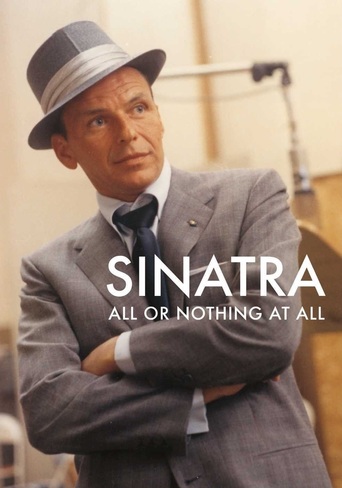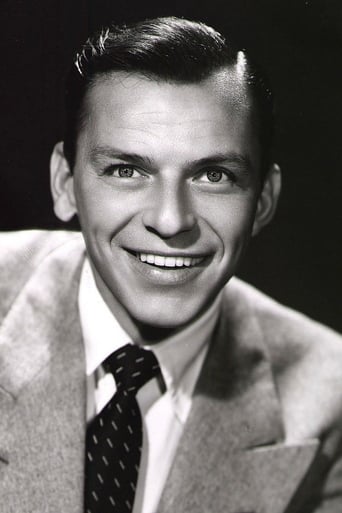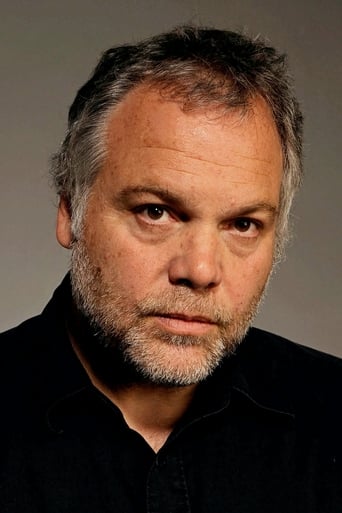

Sinatra: All or Nothing at All (2015)
An up-close and personal examination of the life, music and career of the legendary entertainer. Told in his own words from hours of archived interviews, along with commentary from those closest to him, the documentary weaves the music and images from Sinatra’s life together with rarely seen footage of his famous 1971 “Retirement Concert” in Los Angeles. The film’s narrative is shaped by Sinatra’s song choices for that concert, which Gibney interprets as the singer’s personal guide through his own life.
Watch Trailer
Cast


Reviews
SINATRA - ALL OR NOTHING AT ALL cannot be viewed as anything less than a highly comprehensive biography of the legendary actor/singer. Through four hour-long episodes, director Alex Gibney traces his life from his humble origins in Hoboken, New Jersey, to his radio and film stardom, his abrupt decline in the early Fifties, and his return to enduring stardom once he had signed for Capitol Records and started collaborating with the conductor Nelson Riddle.Although liberally illustrated with reminiscences from members of his family, coupled with archive recordings of "Ol' Blue Eyes" being interviewed on television on radio, and readings of printed autobiographies by Ava Gardner, there are no talking heads appearing on screen. Instead, director Gibney uses archive footage, photographs and specially-shot material, with the reminiscences in sound only. This gives the documentary a unique narrative fluidity that Gibney sustains throughout the lengthy running-time.The central conceit was a good one - using Sinatra's retirement concert in 1971 as a basis, where he sang a series of standards that chronicled his life up to then - Gibney traced the singer's life through the songs. Each one of them were heard once a particular period of his life had concluded. Hence we heard "My Way" right at he end when Sinatra had decided to "finally" retire, having ostensibly fulfilled everything he wanted. The fact that he made a comeback three years later was beside the point.Yet still we are left unsatisfied as to where the director's point of view actually lies. There are certain aspects of Sinatra's life that are either sketchily told or omitted altogether; we hear nothing of his nefarious antics in the early Sixties where JFK and Marilyn Monroe were concerned. Nor do we really discover much about his Mafia connections, except to learn that he enjoyed hob-nobbing with those in power. At one point the documentary refers to his ventures as an entrepreneur, as he founded his own airline (among other things), but that strand is subsequently ignored. We do not know how successful the singer was as a business person.Although the program justifiably makes much of Sinatra's god-given talent as a singer, he nonetheless comes across as a distinctly unsavory personality. He treated two of his four wives extremely badly - only Ava Gardner could really stand up to him; and he seems to have assumed that any woman he encountered would want to go to bed with him. An inveterate social climber, he spent much time and energy helping JFK win his presidential campaign of 1960; but when the Kennedys dropped him - on account of his connections with Mafia boss Sam Giancana - Sinatra transferred his loyalties to the Republican cause. In later life he came out as a supporter of Nixon and Reagan. He obviously did not like to be crossed; there were several instances of him replying to someone with a mouthful of abuse.The interviewees worked hard to foreground his qualities - his enduring commitment to the cause of anti-racism, his generosity with underprivileged children - but we still got the sense that he was not undertaking them out of altruism. So long as he obtained a good press as a result, then he was prepared to continue. Perhaps it's best sometimes that we do not know the intimate details of an icon's personality, as it tends to knock them down from the imaginative pedestal on which we place them.
Sinatra was born in Hoboken, New Jersey, at a time when Hoboken was the punch line of a joke, full of working men's saloons with sawdust floors, ethnically diverse -- blacks, Italians, Irish, and Jews. (Now it's a gentrified Yuppie paradise.) He worked his way up to lead singer with some big bands of the period -- Tommy Dorsey and Harry James -- before striking out on his own. He was picked up by MGM and made a few musicals for them. During the war years, he was a phenomenon of vernacular culture. We haven't seen anything like it recently, not since the Beatles and, before them, Elvis Presley. The skinny Sinatra and his bow ties were parodied in cartoons of the time, but it drove the adolescent girls wild.After the war his career slumped, as careers will, and he took to boozing it up. His movies were flops. Until "From Here to Eternity" which brought him back to the top, chairman of the board, and he turned into the epitome of swinghood. Pals with Sammy Davis, Jr., Peter Lawford, Dean Martin, and others, his lingo entered the lexicon: "Ain't that a kick in the head?", "What a gas!", "Ring-a-ding-ding." And he more or less stayed there for the rest of his life.The documentary is pretty comprehensive. We hear from his friends, his arrangers, and his ex wives. On the audio clips, his voice sounds more Hoboken than it does in his movies or public appearances. He speaks at a quicker pace and curses freely. There are extensive clips from a TV interview with Walter Cronkite. Taken together, they present an image of a down-to-earth singer with a humanitarian streak. He was anti-racist and anti-anti-Semitic. He did more than accept Jews. He ADMIRED them a great deal.At 240 minutes, one is tempted to say there is nothing left to learn about the man. Except that there is. He was everything the film tells us he was, but he was also a man of immense ego. The film tells us that, yes, he palled around with Sam Giancanna but it doesn't tell us who Sam Giancanna was besides a good golfing buddy. The guy was a big-time mobster and murderer at a time when the Mafia had clout enough to sort of lean an election in John F. Kennedy's favor.The word "bodyguard" appears nowhere, yet after becoming a powerful figure Sinatra was ordinarily accompanied by a couple of men the size of small mountains,. There are numerous anecdotes of people who fell afoul of Sinatra for virtually no reason. In his book, "Games People Play," Eric Berne describes an incident in which he found himself at some kind of girly show next to Sinatra's table. He leaned over and jokingly remarked, "I see you're as much a lecher as I am." Moments later, one of the mountain men approached Berne and asked if he would like to have to face rearranged. Peter Lawford received an angry night-time phone call accusing him of dating one of Sinatra's girls, which wasn't true, but it was no use for Crawford to deny it. He was out of the Rat Pack forever.There is no clip of him being called before a congressional investigating committee and snarling back at them, "I am not a second-class citizen!" I was surprised that there wasn't more material on Sinatra's early years with the big bands. He evidently got along fine with Harry James but Dorsey treated him like a tool. And Sinatra's extra-marital love life isn't brought up -- Juliet Prowse and the rest. It must have been like a merry-go-round with a giant calliope pumping away in the background.Personally, I always admired his voice, at least until he began to croak with age and was unable to hit the right note. I don't blame him for the condition, but he seemed not to recognize that he could no longer sing. I was never in his thrall but I learned something from listening to the orchestral arrangements behind his voice. It takes more talent to write and play music than it does to sing pop songs.On the whole, I think the film does for Sinatra's personality what Sinatra's mob connections did for JFK. But, one thing -- it's never dull.
The big question about this tele-biography was whether it would be a balanced overview of Frank Sinatra and his career, or just a fawning snow job.Now in me, you have a person who has, I think, a somewhat balanced view of Sinatra. I neither love nor hate him. I have all of his Reprise studio recordings and many of his Capitol albums the good, the bad, and the ugly. And make no mistake, for a while in the early Reprise years many of Sinatra's recordings are probably the best versions of those songs – both in terms of his vocals and the arrangements – ever recorded. His concept albums for Capitol were groundbreaking. On the other hand, during the Reprise years you have recordings such as "Everybody's Twistin'" and "Life's A Trippy Thing". And, since Frank was totally in control during the Reprise years, there was no one else to blame. I look at his performance in "The Joker's Wild" and can't think of many actors who have ever turned in a better performance. And then there were some of the later films when he just didn't seem to care much. He was a flop on early television, but his 1960s specials were "cherce". So, I can admire much of what Frank Sinatra accomplished. He made a difference in popular music. But when it comes to the kind of man he was, well...my 100th birthday gift is to not finish that sentence.Some of what is said in the program doesn't seem to match with accounts which have been presented in the past. For example, in talking about the Capitol years they indicate Sinatra was in total control. Really? Then why quit Capitol to form Reprise, which at the time he said gave him artistic freedom? Where is the story of "dropping" Peter Lawford for the Kennedy incident? Dropping Joey Bishop? Having a long-term falling out with Dean Martin? Oh, conveniently omitted. The whole mob issue is brought up, but sort of dismissed as the mob did it and the Kennedy's did it, but Sinatra and his friends did everything out of the goodness of their hearts. And, in my view, far too much credit is given to Sinatra and friends for the election of John Kennedy.I didn't have high hopes for this television broadcast when I learned that it was produced by Frank Sinatra Enterprises. Much of the story here is told by Frank himself (in old interviews) and Nancy Sinatra and Frank Jr. After all, Frank thought he was wonderful, Nancy always fawned over her father, and, while Frank Jr. is a bit more balanced, it's almost always pretty positive. Even when the criticism during the war years is brought up (for example), it's within the context of how unfair some people were being to Sinatra. So, make no mistake, this is no penetrating, balanced biography. It should have been entitled "A Love Letter To Frank Sinatra".That's not to say it doesn't have something worthwhile of your time. You'll see film here you will probably never see again. It's comprehensive, if not objective. It's almost as if Sinatra was the only singer, the only actor, the only nightclub performer. He was big, but he was not alone. There was Cole, Crosby, Como, and many more. Frankly, the program couldn't have been more positive toward Sinatra if Sinatra had written it himself.Well, happy birthday, Mr. Sinatra. Your bio reminded me of all the reasons I admired so much of your work...and some of the reasons I didn't really like you as a person. I guess that's a very special way of appreciating you -- it's not easy to dislike someone personally, but buy almost all of their albums, watch all of their television specials, and go see most of their movies. Yup, you were very a very talented man.
Expansive, lengthy, epic documentary of Frank Sinatra is an obvious loving if at times honest (in a way that doesn't dismiss or demean him) portrait of an iconic music and cultural celebrity. His affair with Ava Gardner while married with children, his relationship with the mob, his Rat Pack era, coming up against ups and downs in the music industry, fight to get cast in To Here from Eternity and the subsequent success because of it (I wish "Some Came Calling" had gotten some love, though), his relationship with JFK, his being accused of supporting communism, his antagonistic relationship with the scathing press, his romance with the much younger Mia Farrow, dealing with the changing times of the mid-to-late 60s and early 70s, declining music sales towards the beginning and certainly the end of his music career, the retirement and return from retirement, and his vocal support of civil rights (although his and Dean Martin's treatment of Sammy Davis, Jr. as a buffoon and/or object of comedy with racist jokes is critically held accountable by Harry Belafonte) are all covered. Various figures in his life (and admirers) add narrative voice to the images of Sinatra's life and career. If you are a fan or just interested in the life of Sinatra, then this documentary, All or Nothing at All, could very well be exactly what the doctor ordered. Performances and use of his songs/music are a constant so if you are not one of those who enjoys his vocal arrangements and crooning, then this is definitely something you might want to avoid. But if you are curious about the life and career of Ole Blue Eyes, this documentary will teach you aplenty.




